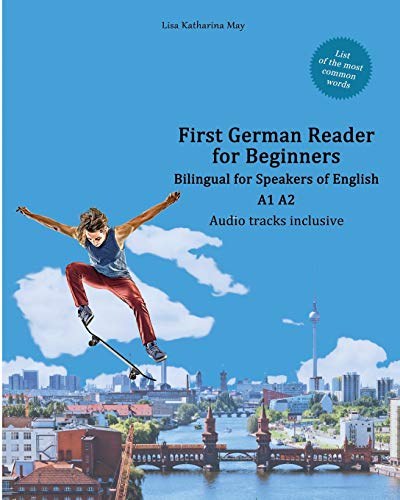
Graded German Readers: 8 Bilingual Books for Beginners
Imagine yourself reading a riveting German mystery novel about a washed-up detective who lost his wife, and is now seeking vengeance on the people who took her away from him.
Well, that can be you even as a beginner—and without having to keep a German dictionary by your side—thanks to German readers.
In this post, we’ll explore eight German readers you can stick your nose into today.
I’ve also added the CEFR levels of each book—which is a six-level scale that represents different fluency levels. A1-A2 is beginner level, B1-B2 is intermediate and C1-C2 is advanced.
Contents
- What’s a Graded German Reader?
- 8 Bilingual German Readers for Boosting German Comprehension
- 1. “Learn German With Stories: Café in Berlin” (A1-A2)
- 2. “Learning German through Storytelling: Mord Am Morgen” (B1-B2)
- 3. “First German Reader for Beginners” (A1-A2)
- 4. “Best Short Stories: A Dual-Language Book” (B1+)
- 5. “Ausgewählte Märchen (Selected Folktales): A Dual-Language Book” (A2+)
- 6. “Short Stories in German” (B1)
- 7. “Graded German Reader: Erste Stufe” (A1-A2)
- 8. “Learn German With Stories: Ferien in Frankfurt – 10 Short Stories for Beginners” (A1-A2)
- What Makes a German Reader Worth Buying
Download: This blog post is available as a convenient and portable PDF that you can take anywhere. Click here to get a copy. (Download)
What’s a Graded German Reader?
A German reader is designed to provide you a wonderful and engaging story, making your learning fun and interesting. However, you should also feel like there’s a teacher next to you at all times. This is achieved by using readers, which provide annotations, dictionaries, quizzes and more.
The overall idea is to give you some of the content in English, along with most of the content in German. German readers build recognition for beginners who may find it a little too intimidating to dive right into a completely German-written book.
They can also serve as a way for more intermediate and advanced learners to brush up on simple grammar and sentences, or to take on complex books that may require them to see translations on the side.
8 Bilingual German Readers for Boosting German Comprehension
1. “Learn German With Stories: Café in Berlin” (A1-A2)
This reader follows a young man from Sicily who moves to Germany and tries to create a new life. Each chapter comes with a German-English dictionary, for checking in with certain lines and vocabulary. You also receive a short quiz after every story to see if you followed along well.
The reader uses what it calls “building blocks” which take paragraphs and sentences instead of simply translating words. This accelerates the learning and assists with making the process more fun and engaging.
2. “Learning German through Storytelling: Mord Am Morgen” (B1-B2)
“Learning German through Storytelling: Mord Am Morgen” is a solid reader for intermediate learners, since exercises are included and they aren’t exactly for fresh, new beginners.
If you enjoy a good detective series, this is a great reader for you. The page-turning story includes illustrations, exercises, on-demand translations and full vocabulary sections for tough words.
3. “First German Reader for Beginners” (A1-A2)
This book consists of beginner and early-learner stories, each of which include funny situations, ranging from studying to searching for a job.
I enjoy this reader because it offers rudimentary yet practical stories, since German learners are more likely to apply for a job than they are to engage in a murder mystery.
The author implements the Approved Learning Automatic Remembering Method system, for repeating words in a systematic way and helping you learn quicker. The reader comes with audio tracks for following along and hearing pronunciations.
4. “Best Short Stories: A Dual-Language Book” (B1+)
Franz Kafka is one of the greatest German writers of all time, so why not learn German by reading his most famous works? Try your hand at stories like “Metamorphosis,” “The Judgement” and “The Country Doctor.”
Each page is written in German, with the English translation on the facing page. There’s something about the facing page translations that makes learning less tedious. It probably has something to do with the fact that you don’t have to fumble around with the pages.
5. “Ausgewählte Märchen (Selected Folktales): A Dual-Language Book” (A2+)
This reader lets you choose from 27 world-famous folk tales from the Grimm brothers. The book has stories like “Cinderella,” “Little Red Riding Hood” and more. Each one is written in German, but the facing page has a complete translation of that particular page.
This reader gives you an advantage, because the stories are recognizable, and they don’t require you to constantly check back with a German-English dictionary.
6. “Short Stories in German” (B1)
The “Short Stories in German” reader provides parallel translations for eight short stories. The reader is designed for all experience levels, but it works best for intermediates who have some German knowledge.
Learn with contemporary literature, and use the annotations for assistance. The main reason learners enjoy this reader is because it has a rich combination of diverse themes and styles.
7. “Graded German Reader: Erste Stufe” (A1-A2)
This is one of the best options for first-year German learners. It has annotations and notes throughout the entire text, and you get reading comprehension quizzes to supplement the stories. Footnotes are offered for explanations, and a verb appendix comes in handy for reference.
If you are learning German, or taking a class, yet you aren’t confident in your abilities to pick up a German book without annotations, this has the tools and guides to ease your fears.
8. “Learn German With Stories: Ferien in Frankfurt – 10 Short Stories for Beginners” (A1-A2)
If you liked the “Café in Berlin” reader we mentioned above, this is the sequel. The main character, Dino, makes his way to Frankfurt to explore a new city and absorb the atmosphere.
Like the original reader, this one has a full German-English dictionary, it includes some annotations for your assistance and you receive quizzes at the end of the chapters.
What Makes a German Reader Worth Buying
When choosing the ideal readers for German learners, I make sure that they followed most—if not all—of the criteria below:
- Well-written stories that make sense and reflect German culture
- Mainly for beginners and intermediates
- Well-annotated with definitions somewhere on the page
- Provides quizzes and answers to help you understand if you followed along correctly. This way, when you can’t answer a question properly, you can go back to figure out what needs to be reviewed again.
- Part of a series. Not all the readers here are in a series, but this is a fun bonus for some readers. If you like the stories you can continue reading. Plus, it helps you stay consistent!
Now it’s up to you to grab one of these wonderful German readers to engage yourself and make your learning process more fun.
From quizzes to direct translations, a reader serves as the first step to truly understanding the intricacies of a German-written book.
So, dive into one of these intriguing readers and use it to start working your way to German fluency.
For more reading recommendations, check out our post on German children’s books for all ages!
Download: This blog post is available as a convenient and portable PDF that you can take anywhere. Click here to get a copy. (Download)


